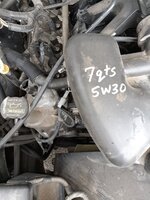Bronze Supporter
- Messages
- 5,282
- Reactions
- 13,699
Ive had good luck with Shell Rotilla in everything from pickup trucks, air and water cooled motorcycles and lawn mowers.
Follow along with the video below to see how to install our site as a web app on your home screen.
Note: This feature may not be available in some browsers.

I recently changed the oil on my wifes new used VW at the manufacturers 10,000K suggestion, and definitely never doing that again, the darkest oil out of any car ive seen. So with that logic, I font stick to the fords suggestion forvyhe 5.4, which I think is 7000mi
Is the VW a diesel? Diesel engine oil will get completely black well before a standard 3000 mile oil change due to the nature of diesel fuel.
My 4Runner got the Toyota recommended 10k mile change on it's second change recently and it still looked new. I refused to wait 10k on the first change and had it done at 5k due to initial break-in particulates.